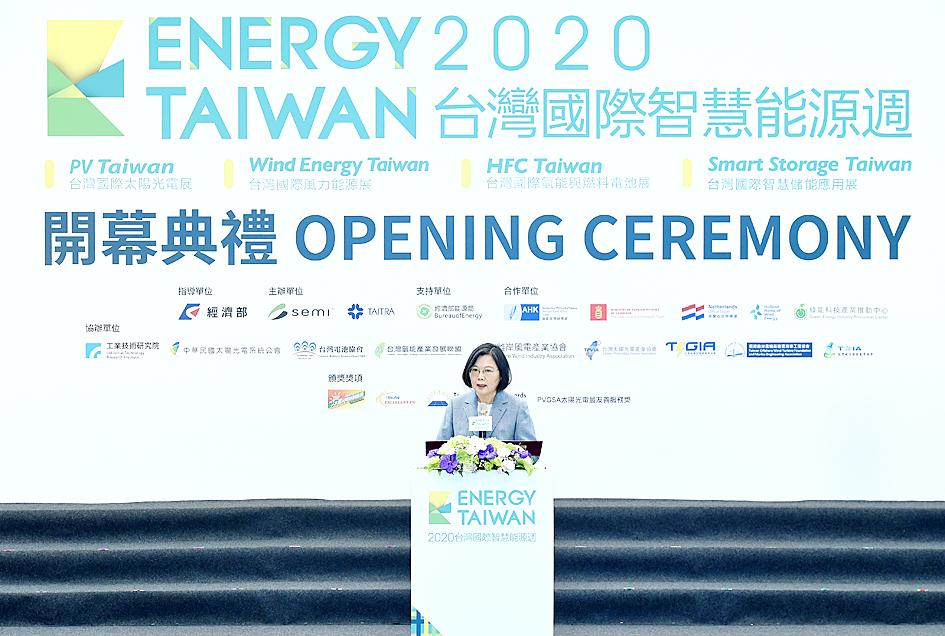Taiwan is on its way to becoming the Asia-Pacific region’s renewable energy development hub, President Tsai Ing-wen (蔡英文) said yesterday.
Speaking at the opening ceremony of the three-day Energy Taiwan forum, which focuses on the development of renewable energy, Tsai said that the nation would continue its strategy of providing clear policy direction, building a complete renewable energy supply chain and ensuring adequate supply of renewable energy.
“Renewable energy has taken off by leaps and bounds over the past four years,” Tsai said. “We now have groups from South Korea and Japan seeking to learn from our experience.”

Photo: Liao Chen-huei, Taipei Times
Taiwan has to maintain three key strategies to become the region’s renewable energy development hub, she said.
“First, we will clearly state our direction for long-term development. This will increase the confidence of international partners to invest,” Tsai said, adding that the government would auction 10 gigawatts of offshore wind projects for development between 2026 and 2035.
“Second, we will build a green supply chain and work with our international partners to enter the global market in the fields of underwater construction, offshore wind equipment and maritime engineering,” she said.
“Third, we will ensure the stability of the supply of renewable energy in Taiwan. It is not only [to keep up with] the growing international trend of increasing the use of renewable energy, it is the key to selling to Apple, Microsoft, Amazon, Facebook and others in the renewable energy supply chain,” Tsai said.
Solar power has significantly contributed to peak electricity usage this summer, Minister of Economic Affairs Wang Mei-hua (王美花) told the forum.
“During peak electricity usage this summer, solar contributed 5 to 6 percent of the power,” Wang said. “We have solar power giving us electricity when we need it the most in the summer, and in the winter the northeast monsoons give us wind energy.”
Energy Taiwan is divided into four sections: smart storage, photovoltaic energy, wind energy and hydrogen fuel cells.
The forum runs until tomorrow at Taipei Nangang Exhibition Center Hall 1.

The US government has signed defense cooperation agreements with Japan and the Philippines to boost the deterrence capabilities of countries in the first island chain, a report by the National Security Bureau (NSB) showed. The main countries on the first island chain include the two nations and Taiwan. The bureau is to present the report at a meeting of the legislature’s Foreign Affairs and National Defense Committee tomorrow. The US military has deployed Typhon missile systems to Japan’s Yamaguchi Prefecture and Zambales province in the Philippines during their joint military exercises. It has also installed NMESIS anti-ship systems in Japan’s Okinawa

TRAGEDY STRIKES TAIPEI: The suspect died after falling off a building after he threw smoke grenades into Taipei Main Station and went on a killing spree in Zhongshan A 27-year-old suspect allegedly threw smoke grenades in Taipei Main Station and then proceeded to Zhongshan MRT Station in a random killing spree that resulted in the death of the suspect and two other civilians, and seven injured, including one in critical condition, as of press time last night. The suspect, identified as a man surnamed Chang Wen (張文), allegedly began the attack at Taipei Main Station, the Taipei Fire Department said, adding that it received a report at 5:24pm that smoke grenades had been thrown in the station. One man in his 50s was rushed to hospital after a cardiac arrest

‘WIN-WIN’: The Philippines, and central and eastern European countries are important potential drone cooperation partners, Minister of Foreign Affairs Lin Chia-lung said Minister of Foreign Affairs Lin Chia-lung (林佳龍) in an interview published yesterday confirmed that there are joint ventures between Taiwan and Poland in the drone industry. Lin made the remark in an exclusive interview with the Chinese-language Liberty Times (the Taipei Times’ sister paper). The government-backed Taiwan Excellence Drone International Business Opportunities Alliance and the Polish Chamber of Unmanned Systems on Wednesday last week signed a memorandum of understanding in Poland to develop a “non-China” supply chain for drones and work together on key technologies. Asked if Taiwan prioritized Poland among central and eastern European countries in drone collaboration, Lin

ON ALERT: Taiwan’s partners would issue warnings if China attempted to use Interpol to target Taiwanese, and the global body has mechanisms to prevent it, an official said China has stationed two to four people specializing in Taiwan affairs at its embassies in several democratic countries to monitor and harass Taiwanese, actions that the host nations would not tolerate, National Security Bureau (NSB) Director-General Tsai Ming-yen (蔡明彥) said yesterday. Tsai made the comments at a meeting of the legislature’s Foreign Affairs and National Defense Committee, which asked him and Minister of National Defense Wellington Koo (顧立雄) to report on potential conflicts in the Taiwan Strait and military preparedness. Democratic Progressive Party (DPP) Legislator Michelle Lin (林楚茵) expressed concern that Beijing has posted personnel from China’s Taiwan Affairs Office to its